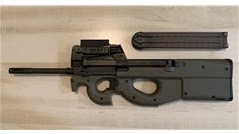Rimfire vs. Centerfire: Which Is Best for You?
Centerfire and rimfire are two different categories of primer ignition systems for ammo, so it is important to understand the specifics of how they differ when you are searching for a new firearm to add to your collection. How does a Kel Tec CP33 chambered in 22LR differ from a Glock 19 chambered in 9mm? And most importantly, which is better to take to the range if you are just going plinking? Here are some of the differences, along with the pros and cons of rimfire and centerfire cartridges.
Round Appearance
The easiest way to tell the rounds apart is to look at the back of the
round. If there is a circular primer in the middle of the back of the
round, it is a centerfire cartridge. If there is no primer that you can
see, it is likely a rimfire cartridge.
Ignition Systems
The firing pin strikes the rim on rimfire cartridges, hence the name.
However, centerfire sees the pin hitting the primer in the center of the
cartridge. Primers in centerfire cartridges are much smaller, while the
primer on a rimfire is typically much larger.
Cartridge Size
Walls on a centerfire cartridge must be thin enough to be crushed by a
firing pin, igniting the primer. This means they tend to be smaller,
such as 22LR. This also means they require less powder, as the same
powder you might use for a 9mm rimfire would blow the 22LR apart.
Cost
Loading your 9mm revolver
will be more costly than loading your 22LR Henry Lever Action. It is
much less expensive to manufacture thin brass with a larger primer than
to manufacture centerfire ammo. A box of 1,000 rounds of 22LR will cost
far less than a box of 50 rounds of 9mm ammo. For this reason, it is not
uncommon for shooters to stock up on rimfire cartridges, as they can be
plentiful and cheap.
Reloading
It is
nearly impossible for most rimfire cartridges to be reloaded. The primer
is in the bottom of the case, unlike centerfire rounds, and cannot be
removed easily. Meanwhile, removing a used primer on a centerfire
cartridge is easy. Centerfire rounds also have thicker brass walls,
which can better withstand deformation while firing. Picking up the
rounds you shot from your Kahr PM9 at the end of a range session for reuse is common, while used rimfire casings are not good for much at all.
Which Is Better for the Range?
Thanks to the cost, if you are just plinking at the range and having
fun shooting, you will probably want to bring a rimfire cartridge, like
22LR. It is much cheaper to have a fun day with rimfire than with
centerfire. Bring the centerfire cartridges if you are focusing on
hunting or practicing for a specific competition, or you need to fire a
particular gun.
About GunBroker.com
GunBroker.com
is the ultimate online marketplace for buying, selling, and browsing
user listings for firearms. It remains among the most trusted platforms
anywhere for buying and selling guns, ammunition, parts, accessories,
and a whole lot more. Sellers can always trust the secure, easy-to-use
sales and auction processes, and buyers love having access to a
streamlined, safe platform featuring such a wide variety of listings.
Plus, GunBroker.com provides an invaluable community for gun enthusiasts
across the country to share information, ask questions, and discuss
their passion for firearms. Whether you are trying to find a Barrett 50
cal, 243 ammo, a Mac 11 gun, or almost anything else, be sure to check
the user listing on GunBroker.com to find the next addition to your
collection.
Browse user listings for ammo, reloading supplies, and firearms at https://www.gunbroker.com/




Comments
Post a Comment